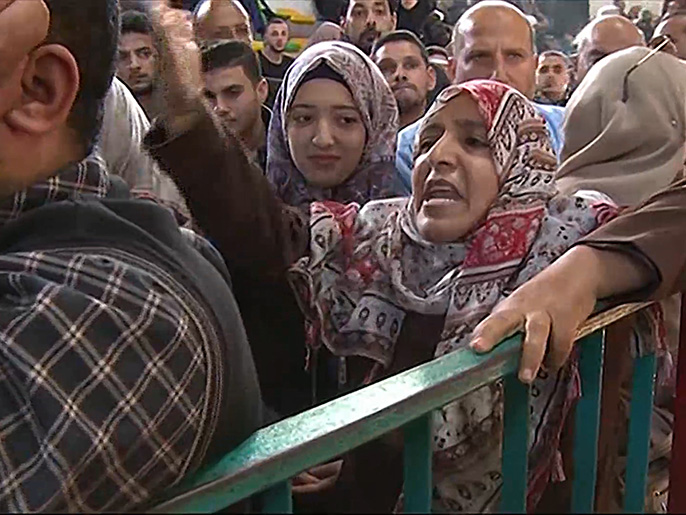Two nights and three days spent by Muhammad Ayoub and his sick father in the open, laying in the ground and wrapping the sky around with thousands of returnees from Cairo to the Gaza Strip, in a journey that lasted only 6 hours.
Ayoub described - to Al-Jazeera Net - this trip as a "piece of Hell", the chapters of which start from the "Fardan Ferryboat" on the Egyptian Suez Canal, passing through many checkpoints and security and military checkpoints scattered in the Sinai to the Rafah land crossing.
Fardan Ferryboat
Ayoub left Cairo with his sick father at dawn last Monday, and arrived at the Fardan ferryboat, astonished by the sight of hundreds of cars adjacent in a long queue, awaiting complex inspection procedures by the Egyptian army forces, before they were allowed to pass to the other bank to complete their way towards Gaza.
Ayoub said, "We spent two nights on the ferryboat, in a very cold atmosphere, in which I felt very anxious and that I would not reach my sick parents safely to Gaza."
Since the closure of the "Peace Bridge" on the Suez Canal for security reasons, about 7 years ago, the Egyptian authorities have allocated the Fardan ferryboat for Palestinian passage back and forth, despite the presence of other ferries, which causes severe congestion that deepens the suffering of travelers.
Ayoub left Gaza more than two months ago on a treatment trip for his father, who was ill with lung cancer, and was unable to return, because the Egyptian authorities closed the Rafah crossing, which is the only outlet for two million Palestinians to and from the Strip through Egyptian territory.
After Morsi
The suffering of Gazans at the Rafah crossing has increased since the Egyptian army overthrew the late President Mohamed Morsi in 2013, as the Egyptian authorities closed the crossing for long times, and opened it exceptionally for a few days in front of humanitarian cases.
Ayoub said, "What the Palestinian traveler is exposed to is unbelievable and unbearable ... a lot of insults, humiliation, extortion and theft."
"I have traveled to Egypt and many countries, but I have never seen in my life what I saw during my last return to Gaza .. Children, women and the elderly sleep on the ground, and they do not find anything to protect them from the cold of the desert, and there are no bathrooms in which to meet their needs," Ayoub adds.
He added, "Everything with money, extortion even when you need to enter a very filthy bathroom, or buy poor food, until the costs of the trip that did not exceed 50 dollars amounted to 500 dollars and more."
This money is not available with the majority of travelers, so their suffering is doubled. Ayoub says, "I saw women go out of their way to spend their needs behind a tree."
The majority of those who returned are those who paid money to mediators and a tourism company related to Egyptian security (Al-Jazeera)
Theft and extortion
The complexity measures practiced by the Egyptian security and military forces encourage extortion by drivers and what Ayoub described as "merchants of suffering." He said, "Traveling through the Rafah crossing has become a trade for many parties, and those who are supposed to protect and facilitate the practices of bandits."
He added, "Because I know what the traveler is subjected to in terms of looting and theft, I did not carry anything valuable with me, but I saw with my own eyes the confiscation of security and military personnel at the checkpoints and checkpoints gifts from travelers' bags ... I saw a 60-year-old woman crying and begging an officer not to confiscate a mobile phone that she brought as a gift." Her daughter is from Turkey and has a bill for it and she passed it from Cairo airport, but to no avail, and she did not stop praying for him all the way to Gaza.
Ayoub considers himself one of the lucky ones to arrive safely with his father to Gaza, despite the journey of pain and suffering, while the four days of opening the crossing were not enough for thousands of Palestinians to make the return journey, and they will have to wait for a new date to open the crossing.
According to the General Authority for Crossings and Borders in the Palestinian Ministry of Interior, only 2,702 Palestinians were able to return to Gaza.
Palestinian activists say - through social media - that the majority of those who returned are those who paid money to mediators and a tourism company linked to Egyptian security in exchange for facilitation measures.
Travel merchants
The journalist, Hisham Saqallah, said in an article in which he narrated the suffering of a friend who had a bitter travel experience, that opening the crossing became an opportunity for corrupt Egyptian officers.
The suffering is not limited to the returnees to Gaza. Saqallah says that there are companies that exploit those who wish to travel from Gaza to coordinate for them in exchange for varying amounts, exceeding a thousand dollars per person, and are shared by mediators in Gaza and influential officers in Egypt.
And the resistance factions expressed - in a statement - their amazement at what the returnees to Gaza, most of whom are elderly, women, sick and students, are exposed to, and their stay for days in the bitter cold.
She said, "This suffering increases the burden of travel agony and fatigue on them, especially in light of the closure of the Rafah crossing for long periods, despite our appreciation for the security conditions that brotherly Egypt is going through."
At the same time as the factions headed to Cairo to participate in the national dialogue, voices raised the importance of discussing the issue of the Rafah crossing with the Egyptian authorities, and the demand for the necessity of re-working there in a natural way that preserves the dignity of Palestinian travelers.

